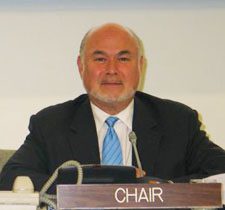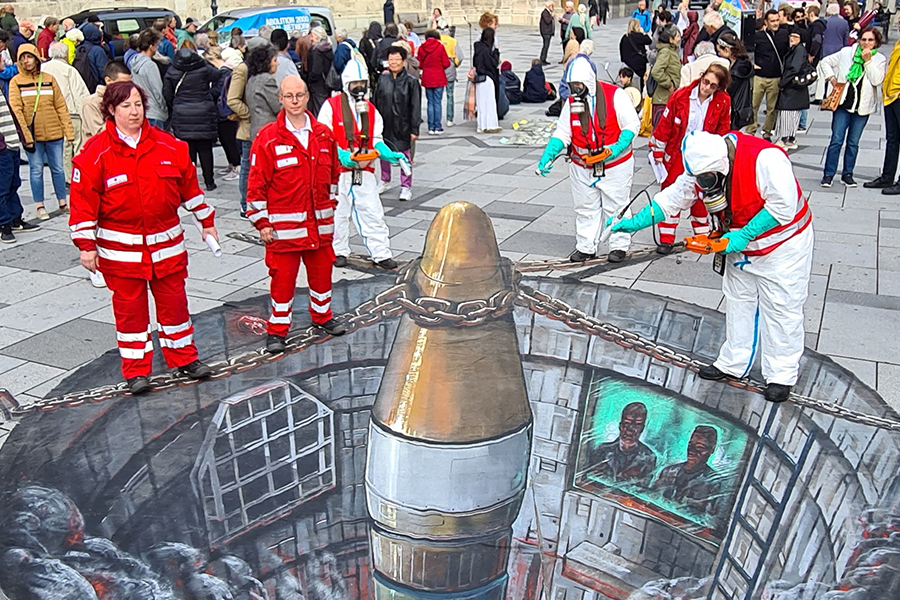A Message from the President
 |
|
One could reasonably assert that the Nuclear Non-proliferation Treaty (NPT) is the third most important legal instrument of the 20th Century, standing behind the United Nations Charter and the Universal Declaration of Human Rights. Without the NPT, dozens of states would have raised the hazard of nuclear weapons beyond the breaking point. The risk of nuclear annihilation, however, remains unacceptably high. For that reason, the progress obtained by some 190 nations at the May 2010 NPT Review Conference at the UN should be recognized as a significant diplomatic achievement which opens avenues of opportunity and thus responsibility for all who are concerned to obtain, in the words of President Obama, the “peace and security of a world without nuclear weapons.”
The NPT’s core elements of ensuring peaceful uses of nuclear technology and progress toward nuclear disarmament and non-proliferation are reviewed every five years. Lack of support for multilateralism led to a failed 2005 Review Conference (see The Nuclear Non-proliferation Treaty and Its 2005 Review Conference: A Legal and Political Analysis, New York University Law Review). This year, diplomats came with an understanding of the urgency of restoring confidence in the international non-proliferation and disarmament regime. The positive atmosphere generated largely by the new US-Russia START agreement, a diminished role for nuclear weapons in the new US Nuclear Posture Review, and a forward-looking communiqué from the April 2010 US-hosted Nuclear Security Summit, coupled with outstanding diplomatic acumen exercised by the conference President Libran Cabactulan, inspiring interventions by Secretary-General Ban Ki-moon, and genuine passionate commitment to success demonstrated by several key middle power delegations, helped to achieve a consensus on moving forward.
In the Final Statement’s section on Conclusions and Recommendation For Follow on Action, the reaffirmation of commitments to pursue nuclear disarmament, convene a conference on a weapons of mass destruction free Middle East, and recognition of the legitimacy of a nuclear weapons convention are but a few of the many significant accomplishments. I recommend several outstanding articles on the outcome: The 2010 NPT Review Conference: Deconstructing Consensus By William Potter, Patricia Lewis, Gaukhar Mukhatzhanova, and Miles Pomper, Reaching Critical Will’s News in Review Final Edition 21, and NPT: Challenging the Nuclear Powers’ Fiefdom by MPI Expert Adviser Rebecca Johnson, Executive-Director of the Acronym Institute. In sum, the document highlighted, as political commitments, principles and policies that need to be pursued.
The Middle Powers Initiative made a material contribution to this success by hosting seven major conferences over the past five years designed to help forge a practical consensus agenda and it is remarkable that agreement was obtained on most of the recommendations arising from this process. (See: Key Points from the 2010 NPT Review Conference Final Document) Also, the momentum of parliaments the world over, in part generated by the extraordinary work of the Parliamentarians for Nuclear Nonproliferation and Disarmament, helped give political support to many diplomats (See: the Compilation of Resolutions Supporting the Secretary-General’s Five Point Plan).
Yet, diplomatic success does not immediately translate into the needed changed practices. Enormous economic allocations to “modernize” the US nuclear weapons complex — $180 billion over the next ten years – is but one nuclear weapons state’s example of the distance between aspiration and realization of downgrading nuclear weapons. The other nuclear weapon states are, with far less funding, similarly engaged in modernization programs. Moreover, military planners in all states with nuclear weapons remain deeply committed to advocating the value of their nuclear missions and appear unwilling to enthusiastically endorse disarmament progress. Thus, the work of civil society advocacy is critically important. Who else can have the privilege of advocating for the global public good without the bureaucratic constraints of representing only one nation? Nuclear weapons represent a clear example of an issue that poses a global threat and thus requires a global security perspective in its advocacy.
We should all thank the many civil society groups and government officials who worked so hard to obtain a successful outcome. In particular, conference committee chairs Ambassador Chidyausiku (Zimbabwe), Ambassador Yelchenko (Ukraine), Ambassador Nakane (Japan), Ambassador Marschik (Austria), Ambassador Kelly (Ireland), Ambassador Cancela (Uruguay) and US Ambassador Susan Burke whose exceptionally adroit diplomatic skills stewarded the Review Conference to achieve consensus, and to Reaching Critical Will, the International Campaign to Abolish Nuclear Weapons and the Acronym Institute, whose daily reporting and insights on various aspects of the Conference were extraordinary and valuable contributions to the international debate.

Jonathan Granoff
President
Back to eNewsletter…
![]()
![]()
The Global Security Institute is dedicated to strengthening international peace and security based on co-operation, diplomacy, shared interests, the rule of law and universal values. Our efforts are guided by the skills and commitment of our team of former heads of state, distinguished diplomats and politicians, celebrities, religious leaders, Nobel Peace Laureates, disarmament and legal experts, and concerned informed citizens. Our focus is on controlling and eliminating humanity’s greatest threat – nuclear weapons.







